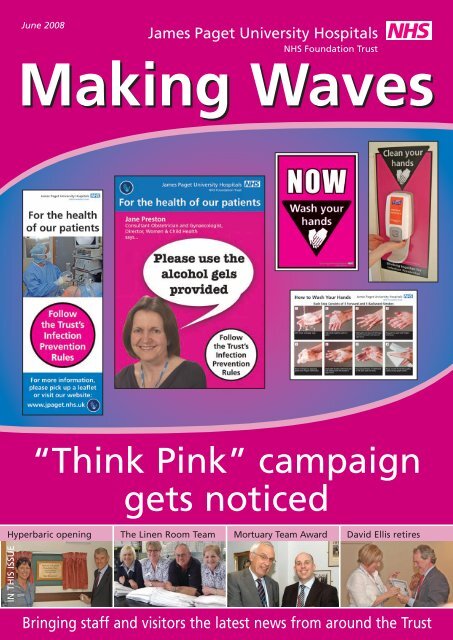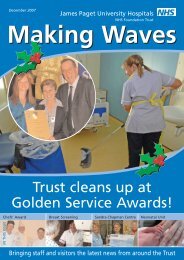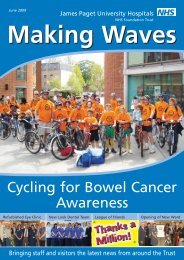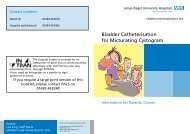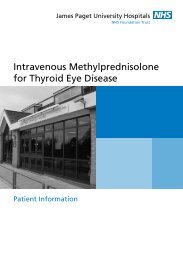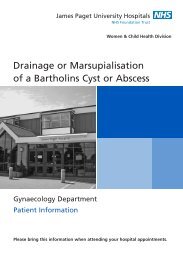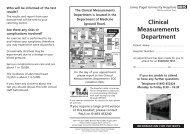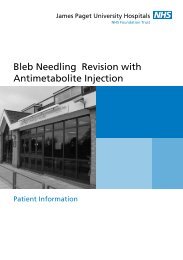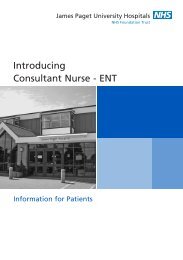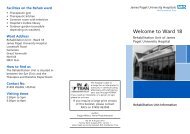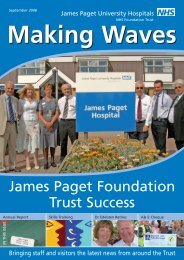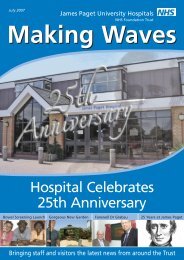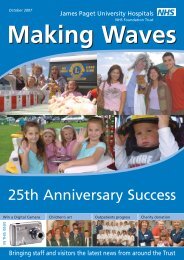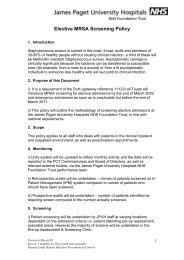FT Making Waves Sept 06 - James Paget University Hospitals
FT Making Waves Sept 06 - James Paget University Hospitals
FT Making Waves Sept 06 - James Paget University Hospitals
You also want an ePaper? Increase the reach of your titles
YUMPU automatically turns print PDFs into web optimized ePapers that Google loves.
June 2008<br />
<strong>James</strong> <strong>Paget</strong> <strong>University</strong> <strong>Hospitals</strong><br />
NHS Foundation Trust<br />
<strong>Making</strong> <strong>Waves</strong><br />
“Think Pink” campaign<br />
gets noticed<br />
Hyperbaric opening The Linen Room Team Mortuary Team Award David Ellis retires<br />
IN THIS ISSUE<br />
Bringing staff and visitors the latest news from around the Trust
Editor’s Hello<br />
Welcome to the June<br />
edition of <strong>Making</strong> <strong>Waves</strong>.<br />
It’s easy to see that the<br />
Trust’s ‘Think Pink!’<br />
campaign has even hit<br />
<strong>Making</strong> <strong>Waves</strong> this month,<br />
although for one issue only!<br />
The campaign to increase<br />
awareness of infection<br />
prevention has been going<br />
well so far, and has been<br />
very well received by staff<br />
and patients alike. There<br />
have been many<br />
suggestions of different<br />
ways to get our message<br />
across, and lots of positive<br />
feedback. Love them or<br />
loathe them, the posters are<br />
making a lasting impression<br />
on people!<br />
We’ve also been out and<br />
about and had a couple of<br />
behind the scenes visits, to<br />
our switchboard and to our<br />
linen room. Find out a little<br />
more about how these<br />
crucial services run, and who<br />
works there on pages 13<br />
and 9.<br />
Many of you will be<br />
aware that it’s the 60th<br />
anniversary of the NHS this<br />
year. They’ll be coverage in<br />
the local and national<br />
media of this important<br />
event, but we’ve chosen to<br />
use this issue of <strong>Making</strong><br />
<strong>Waves</strong> to highlight some of<br />
our achievements last year,<br />
and the fantastic investment<br />
we’ve made in staff and<br />
facilities over the last twelve<br />
months.<br />
The next issue of <strong>Making</strong><br />
<strong>Waves</strong> is due out in<br />
<strong>Sept</strong>ember. The deadline for<br />
submissions is Friday 25th<br />
July, so do let us know if<br />
you have any news you<br />
want to share.<br />
Farewell to Dr David Ellis,<br />
Consultant Physician<br />
On Friday 11th April the <strong>James</strong> <strong>Paget</strong> <strong>University</strong> <strong>Hospitals</strong> said farewell to Consultant<br />
Physician Dr David Ellis, who has worked at the Trust since 1983. Hundreds of colleagues<br />
in the Celebration Suite at the Burrage Centre said goodbye. This was preceded by a<br />
surprise in the morning when over 70 of Dr Ellis’ patients, past and present, gathered to<br />
thank him and to wish him well in his retirement.<br />
In their speeches, colleagues recognised Dr David Ellis’ exceptionally important role at<br />
the <strong>James</strong> <strong>Paget</strong>, providing the highest possible standard of patient care. Dr Ellis trained<br />
in Edinburgh, and completed his post graduate training in Newcastle. He arrived at JPH<br />
in 1983, the second year after it opened, joining a team of four physicians. Dr Ellis<br />
specialised in chest medicine and rapidly set about establishing a highly regarded<br />
respiratory medicine department. During his time at the JPUH, he has held 27 different<br />
posts, including Medical Director from 1993 to 1998, and leading cancer care across East<br />
Anglia and beyond as Lead Clinician for the Norfolk and Waveney Cancer Network.<br />
Tributes came from all over the hospital. John Wells, previous Trust Chairman said he<br />
was ‘a great colleague and a great friend.’ Recently retired Consultant Surgeon Hugh<br />
Sturzaker said. ‘We are extraordinarily fortunate to have had David Ellis here at the<br />
<strong>James</strong> <strong>Paget</strong>.’ Trust Chairman John Hemming thanked him saying: ‘Thanks from everyone<br />
for what you have done for the community, your patients, and your contribution to the<br />
life of the <strong>Paget</strong>.’<br />
Heather Matthews, Respiratory Nurse Specialist, spoke on behalf of the nurses, saying:<br />
‘The whole nursing team always felt supported, valued and listened to by Dr Ellis. And so<br />
did his patients. They always felt like partners in their care when Dr Ellis was looking<br />
after them.’<br />
Dr Ellis received a digital camera and many other gifts. He looks forward to his<br />
retirement with wife Marjy and their four children, and plans to travel and spend more<br />
time in their garden.<br />
As he left, Dr Ellis said:’ I had the most wonderful surprise, meeting all my patients on<br />
my last working day. That was absolutely fantastic.’ He thanked the important women in<br />
his life, Heather Matthews, Respiratory Nurse Specialist, Linda Harbottle his secretary who<br />
worked with him from his first day at the <strong>Paget</strong> and his wife, Marjy who he said had<br />
been ‘steadfast and supportive throughout his whole career.’<br />
Rebecca Driver<br />
Head of Communications<br />
and Foundation Secretary<br />
2 June 2008 <strong>Making</strong> <strong>Waves</strong> www.jpaget.nhs.uk
Last Year’s Trust<br />
Achievements<br />
Chief Executive Adrian<br />
Pennington has<br />
recently been giving a<br />
series of presentations<br />
on the Trust’s<br />
achievements in the<br />
last financial year.<br />
He collected information from all over<br />
the hospital from Divisions and<br />
Departments, and has used highlights<br />
from the last twelve months.<br />
Adrian said:<br />
‘Our achievements in the last<br />
financial year were really phenomenal,<br />
and that’s a credit to every single<br />
person working here. We’ve made<br />
dramatic progress on waiting times for<br />
outpatients and inpatients. We met the<br />
18 week target, made a significant<br />
reduction in access to our diagnostic<br />
services. For example, waiting times for<br />
MRI and CT and now just 2-3 weeks for<br />
the majority of our patients, when<br />
there were 26 week waits in 20<strong>06</strong>/07.<br />
Endoscopy waiting times have fallen in<br />
two years from 13 weeks to just 3<br />
weeks, again for the majority of<br />
patients.’<br />
Adrian continued: ‘Alongside this,<br />
we have invested £5.2 million in<br />
building refurbishments and new<br />
equipment last year (see the list next to<br />
this article). And we’ve developed a<br />
range of new services including a one<br />
stop heart failure clinic, a new age<br />
related macular degeneration service<br />
and hospital at night. This has been<br />
complemented with a number of new<br />
staff, in particular new Consultant<br />
appointments in A&E, GU Medicine,<br />
Gastroenterology, Medical Oncology<br />
and Orthopaedics. What’s important is<br />
that these are new Consultant<br />
appointments, adding to our teams of<br />
specialists.’<br />
‘We’ve also been working to<br />
develop relationships locally, and this<br />
theme of working together will be<br />
critical as we take forward our estates<br />
review. This is now complete, and we’re<br />
moving into the next phase which I<br />
hope to share more details of with staff<br />
soon. I will continue to focus on the<br />
strength of our strategic partnerships<br />
because this will be critical to us over<br />
the coming months and years.’<br />
www.jpaget.nhs.uk<br />
Dramatic reductions in<br />
waiting times for our<br />
patients<br />
In April we celebrated our success in reducing waiting times for our patients.<br />
The figures show a dramatic reduction in waiting times for patients who are<br />
seen in clinics and admitted to the hospital.<br />
March 2007 March 2008<br />
Inpatients 30% admitted in 18 weeks 87% admitted in 18 weeks<br />
Outpatients 50% seen in 18 weeks 90% seen in 18 weeks<br />
Julie Cave, Director of Finance and Performance<br />
at the Trust said: ‘This is a fantastic success story<br />
and really excellent news for our patients. In just<br />
one year, our patients are waiting for much less<br />
time that they were in Spring 2007. Put simply,<br />
we are seeing and treating our patients much<br />
faster.’<br />
She continued: ‘This achievement is down to the commitment and<br />
dedication of all our staff who have worked hard to drive down waiting times.<br />
From the administration teams through to the medical and nursing teams, and<br />
all our support services, everyone plays a part. Delivering waiting times of 18<br />
weeks for our patients has given us the opportunity to review how we work<br />
and to share ideas across the organisation for best practice. That’s what’s made<br />
the difference. We have also reduced waiting times for all our diagnostic<br />
services like X-ray, CT, MRI scans and cardiac measurement. This has helped to<br />
increase the speed we can see people.’<br />
Julie finished by saying: ‘Waiting for an operation or an appointment can<br />
be a very anxious time. Waiting for less time makes it a little easier for<br />
patients and their families. We will continue to work hard to maintain these<br />
waiting times for all our patients.’<br />
Investment News<br />
The Trust Investment Group, more commonly known as TIG, meets quarterly to<br />
agree where the Trust can invest money in equipment and service<br />
developments.<br />
At their last meeting significant levels of investment were made, and in this<br />
issue of <strong>Making</strong> <strong>Waves</strong> we bring you up to date on the money spent across the<br />
Trust over the last few months.<br />
Bids for money to support service<br />
development were approved<br />
including:<br />
• A new GI bleed rota to provide weekend<br />
cover<br />
• Weekend trauma sessions<br />
• A new Consultant Orthogeriatrician post<br />
• A Rheumatologist Specialist Nurse<br />
• A Practice Development Nurse (time-limited)<br />
Capital bids were approved including:<br />
• Incubator for GUM £7,500<br />
• Operating table £39,271<br />
• Diathermy machine £12,047<br />
• Arthroscopic surgical instruments £65,271<br />
• Hawk replacement (ophthalmology images)<br />
£8,023<br />
• Echo machine £100k<br />
• Dialysis machines (2) £35k<br />
• Baby incubators £49k<br />
• Replacement anaesthetic machines £36k<br />
• Ultrasound scanner for EADU £28k<br />
• Diathermy equipment (Gynae) £8k<br />
• Ventilators £81k<br />
• Replacement monitor for MRI £38k<br />
• Colonoscope imager £66k<br />
• Additional teleconferencing facilities £22,509<br />
June 2008 <strong>Making</strong> <strong>Waves</strong> 3
New Patrons<br />
for Palliative<br />
Care East<br />
Palliative Care East has recently<br />
announced its new patrons,<br />
including TV personality Gloria<br />
Hunniford.<br />
Chairman John Hemming said:<br />
‘Our Patrons are hugely important<br />
as ambassadors, helping us to<br />
promote the Appeal as widely as<br />
possible. To have the support of<br />
our Patrons is a great asset to our<br />
appeal offering their commitment<br />
and endorsement in the same way<br />
as everyone who has helped to<br />
raise money and give their support<br />
to the hospital appeal in many<br />
ways.’<br />
John continued: ‘We are<br />
delighted that Gloria Hunniford,<br />
with her insight and understanding<br />
of Palliative Care, has agreed to be<br />
a Patron and through the Caron<br />
Keating Foundation, has helped<br />
many causes very similar to ours<br />
across the country.’ Gloria said:<br />
‘I am greatly<br />
encouraged by<br />
the plans and<br />
principles for the<br />
Palliative Care<br />
East Centre, and<br />
I am delighted<br />
to become a<br />
Patron of the<br />
Appeal. The new centre will<br />
provide the right support for<br />
patients and families, helping them<br />
in a positive life affirming way. In<br />
my experience, centres such as<br />
these help patients not to fear<br />
death, and this is so important. I<br />
look forward to hearing about the<br />
progress of the Appeal with great<br />
interest.’<br />
The other Patrons are:<br />
Brian and Judy Potter<br />
Hugh Sturzaker<br />
<strong>James</strong> Hoseason<br />
Richard Jewson -<br />
Lord Lieutenant of Norfolk<br />
Hugh Crossley<br />
Tony Mallion<br />
Bruno Peek<br />
Keith Skipper<br />
Ian Miller<br />
Ian McCreadie<br />
Jean Mason<br />
Michael Muskett<br />
Dr William Notcutt<br />
Tony Wright MP<br />
Bob Blizzard MP<br />
4 June 2008 <strong>Making</strong> <strong>Waves</strong><br />
Paediatric Team develop<br />
clinical teaching course<br />
The Paediatric Department successfully organised for the very first time a Clinical<br />
Teaching course in February run at the Training and Education Centre. This was a<br />
joint venture between the <strong>James</strong> <strong>Paget</strong> and Norfolk and Norwich Paediatric<br />
Departments.<br />
Dr Nirmal, Consultant Paediatrician and Departmental Tutor who was the local<br />
course organiser said: ‘The main objective of this course was to give MRCPCH part 2<br />
clinical exam going candidates as much hands on experience as possible in both<br />
clinical and communication stations’.<br />
Dr Vipan Datta, Consultant Paediatrician and Departmental Tutor from Norfolk<br />
and Norwich <strong>University</strong> Hospital was the other course organiser. Dr Stocks and Dr<br />
Chapman , Consultant Paediatricians at JPUH, Dr Al-Sabbagh, Dr Palanivel and Dr<br />
Choudhary, Paediatric Specialist Registrars were also part of the faculty for this<br />
course.<br />
Candidates from different parts of the country attended the event, which was<br />
run over 2 days, 8th and 9th February. The course included lectures by Consultant<br />
Paediatricians who are College examiners for MRCPCH clinical exams. This was<br />
followed by mock exams with real patients in exactly the clinical exam pattern. The<br />
other special feature of this course was a fully fledged mock communication and<br />
history taking stations, with professional actors on day two.<br />
The course was well received and the feedback was excellent. The facilities at our<br />
Education & Training Centre were appreciated by external faculty and candidates.<br />
The Paediatric department would like to thank patients and parents who were the<br />
backbone for the success of this course. The next course will be in June at NNUH.<br />
New fast-track service<br />
reduces blindness from<br />
macular degeneration<br />
Mr Craig Goldsmith and Mr Ben Burton, Consultant Ophthalmologists, tell <strong>Making</strong><br />
<strong>Waves</strong> about the new service they have set up which will save the sight for<br />
hundreds of our patients:<br />
The Ophthalmology Department has just established a fledgling fast-track<br />
service for patients with the “wet” form of age-related macular degeneration<br />
(AMD). This is the leading cause of vision loss and blind registration over the age of<br />
65 in the UK and previously had no effective treatment.<br />
Until now….Recently the National Institute for Clinical Excellence took a long<br />
hard look at trials of a novel antibody to a naturally occurring hormone called<br />
VEGF, which is a major driver behind the disease. The drug it has recommended,<br />
Lucentis, works by binding to VEGF inside the eye and stopping the leakage and<br />
bleeding associated with wet AMD. It is thought that it stabilises vision in 95% and<br />
improves it in 35%, which is remarkable given that these eyes would have no<br />
usable central vision in the majority of cases.<br />
Great Yarmouth and Waveney PCT was quick to commission the treatments<br />
from the eye department. These consist of rapid assessment in the clinic and a<br />
series of three (remarkably painless!) injections into the eye over three months. Any<br />
recurrence of the leakage is treated with “booster” injections. The service is<br />
expected to increase its caseload rapidly over the next couple of years to over 1000<br />
injections. This has led to pressures on the eye clinic, particularly for the follow-up<br />
appointments, but we believe the extra work certainly pays off in the vision saved.<br />
www.jpaget.nhs.uk
Local MP opens new<br />
Hyperbaric Chamber<br />
On Friday 25th April Bob Blizzard MP officially opened our<br />
new hyperbaric chamber which is already providing a service<br />
for the whole of the Eastern Region and beyond. Our first<br />
patient was flown over to us from Bristol!<br />
The new chamber was craned into place in December 2007 and replaced the<br />
existing one which was opened in 1996. It is already providing a fantastic new and<br />
superior service for patients in a spacious chamber environment. Patients are simply<br />
wheeled in through the large chamber door, and they also have the choice of lying<br />
down or sitting in a comfy chair during their treatment.<br />
Bob Blizzard MP said: ‘I am delighted to officially open this new hyperbaric unit.<br />
It is ideally located here to service all the NHS hospitals in the region. This is an<br />
excellent example of a public-private partnership and shows the benefits of JPUH<br />
being a Foundation Trust.’<br />
Dr Pieter Bothma, Consultant Anaesthetist with a special interest in hyperbaric<br />
medicine said:<br />
‘I believe we have the best staff and the best equipped unit for critically ill<br />
patients in the country.’<br />
Patient Tom Clark from Beccles (pictured right) knows just how important the<br />
treatment is. As a type 1 diabetic, on insulin for 56 years, he recently lost the lower<br />
part of his right leg and is battling to save the other one. He said: ‘I have very poor<br />
circulation in my extremities and I’m hopeful that this treatment will help me to<br />
preserve my other leg. It’s going well so far, and I think it’s fantastic.’<br />
Consultant Anaesthetist Bob Mann was pleased with his progress saying: ‘You<br />
can already see the improvement as the treatment helps Tom’s circulation and<br />
assists tissue repair.’<br />
Foundation<br />
degree starts<br />
The first cohort for the Foundation<br />
Degree started here in March 2008, with<br />
18 students enrolled from across the<br />
Trust. The Degree is run by the <strong>University</strong><br />
Campus Suffolk. The students on the<br />
course all have different clinical<br />
experiences and this in itself will enhance the group. The aim of<br />
the course is to provide the individuals with increased knowledge<br />
and reflection skills, ultimately enhancing patient care.<br />
There is great excitement amongst everyone taking part.<br />
Jacqui Lacey, Clinical Support Assistant said: ‘We are a dynamic<br />
www.jpaget.nhs.uk<br />
team and we are really looking forward to learning together and<br />
experiencing the course as it unfolds.’<br />
Look out for updates on their progress in <strong>Making</strong> <strong>Waves</strong>.<br />
Sharon Crowle<br />
Head of Nursing Education and Practice Development<br />
June 2008 <strong>Making</strong> <strong>Waves</strong> 5
Patient Surveys<br />
Gives the<br />
Thumbs up<br />
Recent patient satisfaction surveys in the<br />
Women and Child Health Division show a high<br />
level of patient satisfaction with the services<br />
provided in our Children’s Allergy Clinic and<br />
in our Sub Fertility Department.<br />
The Children’s Allergy Clinic provides a valuable service to<br />
a large number of patients all year round. It was decided to<br />
review the service, with the aim to further improve the<br />
quality of service already provided. There was good<br />
feedback on information received before the appointment,<br />
the child friendly environment and the advice given by the<br />
doctors and the paediatric allergy nurses.<br />
100% of parents/carers felt involved in the decisions made<br />
about their child’s care and treatment. Some of the<br />
comments about the service included:<br />
In the Sub Fertility Department, the team hoped that<br />
ideas from patients may also help to develop services.<br />
Dr Peter Greenwood, Consultant<br />
Obstetrician and Gynaecologist said:<br />
‘We received some really helpful<br />
comments on signposting to the unit,<br />
and about the size of the waiting<br />
area. We hope to be able to address<br />
some of the concerns soon.’<br />
Patients were very positive about the service saying:<br />
‘The staff at the Waveney Suite were brilliant. They kept<br />
me at ease through all the procedures which was very<br />
comforting, and answered all my questions.’<br />
‘I found the staff’s manner very reassuring as well as<br />
professional. I felt very at ease while being treated.’<br />
‘This clinic was amazing! Everyone was so kind and<br />
helpful and the information given was excellent.<br />
Thank you!’<br />
‘Both Doctors were<br />
informative, friendly and<br />
helpful and thoroughly<br />
explained everything to<br />
us. The service we<br />
received was of a very<br />
high standard.’<br />
‘The whole experience<br />
was very good. We<br />
were not kept waiting<br />
for long periods of time<br />
and a diagnosis was<br />
made immediately,<br />
with an emergency<br />
plan discussed.’<br />
Dr John Chapman, Consultant Paediatrician<br />
said: ‘We find these surveys really helpful.<br />
It’s good to know what we are doing well,<br />
and there are always suggestions from the<br />
parents which can help us to improve the<br />
service further.’<br />
6 June 2008 <strong>Making</strong> <strong>Waves</strong><br />
www.jpaget.nhs.uk
“Think Pink!”<br />
Campaign Launch<br />
On Thursday 1st May, we launched our ‘Think Pink!’ campaign<br />
to raise awareness about infection prevention in the hospital<br />
and the wider community. With a range of eye catching<br />
posters in shocking pink, patients and visitors cannot fail to<br />
notice the important messages that help to stop the spread of<br />
infection.<br />
Nick Coveney, Director of Nursing and Patient Services said: ‘We wanted to take<br />
a fresh look at all of our infection prevention information. We considered new<br />
ways of getting our message across to all our patients and visitors, with the added<br />
benefit of reminding our staff too. We selected the shocking pink colour in a<br />
deliberate move away from the standard yellow and black used widely for infection<br />
control. We titled our campaign ‘Think Pink!’. We wanted to feature staff in the<br />
campaign, at every level, so we developed the ‘bubble poster’ idea, with large<br />
photos, reminding everyone of our key infection control messages. Now, around<br />
every corner in the Trust, you’re greeted with a different member of staff, and<br />
some children too, with a comment on following the infection prevention advice<br />
‘for the health of our patients’. These, coupled with the eye-catching colour, are<br />
proving to be an excellent way to get our message across.’<br />
Alongside the bubble posters we have sets of<br />
'storyboards' which explain what Healthcare Acquired<br />
Infections (HCAIs) are, and what JPUH is doing to tackle<br />
them. These are all over the site too. We have also<br />
introduced pink surrounds for ALL the hand gel dispensers in<br />
big sizes in hard plastic. They are eye-catching at the<br />
entrance to all wards and clinics, AND easy to clean!<br />
Nick added: ‘We’ve also got five giant pop up displays<br />
around the site (they move at night and pop up in different<br />
places!) and a range of pink notices for all our toilets to<br />
remind people about hand washing. And we’re installing<br />
inserts for the floor at the entrance to ward areas in the next<br />
month or so.’<br />
The campaign has already attracted lots of interest from other Trusts visiting<br />
JPUH on the back of our success in reducing the rates of C Diff. The costs for the<br />
campaign have been met by our League of Friends, which has made the whole<br />
initiative very affordable indeed.<br />
You can contact the<br />
Infection Prevention Team<br />
on Ext. 2168<br />
www.jpaget.nhs.uk<br />
June 2008 <strong>Making</strong> <strong>Waves</strong> 7
Essence Of Care Update<br />
The current benchmark being undertaken within the Trust is Pressure Ulcers.<br />
Audits include the observation of:<br />
• Screening and Assessment<br />
• Information provided to patients and<br />
carers<br />
• Individualized planning for prevention<br />
and treatment of pressure ulcers<br />
• Pressure ulcer prevention:<br />
• Implementation of individualized plan<br />
• Evaluation of interventions<br />
On completion of the audits, following<br />
the Essence of Care framework, a<br />
comparison group meeting will be organized<br />
to share and develop action points at ward<br />
level and also at corporate level.<br />
A pressure relieving equipment inventory<br />
has also been requested from the wards,<br />
assisting future planning of the trialling and<br />
ordering of pressure relieving equipment.<br />
A more detailed account of the findings<br />
and actions from the audit will be included<br />
in the next Essence of Care update.<br />
Food and Nutrition benchmark ~<br />
Protected Mealtimes<br />
The concept of Protected Mealtimes has<br />
been previously launched within the Trust,<br />
with staff successfully implementing the<br />
initiative in some areas very well. However, a<br />
recent nutrition audit identified many nonurgent<br />
clinical activities continued to take<br />
place during the times allocated as protected<br />
mealtimes, so it is proposed that we relaunch<br />
the Protected Mealtime initiative<br />
again.<br />
Mealtimes in the past have been seen as<br />
an interruption to the busy ward routine<br />
and to the patient’s treatment. As the<br />
importance of nutritional support is<br />
becoming once again a priority, mealtimes<br />
are now being regarded as an essential part<br />
of the patient’s treatment, where the<br />
therapeutic role of food within the healing<br />
process cannot be underestimated; however,<br />
food is only of any value if the patient<br />
actually eats it!<br />
What are Protected Mealtimes?<br />
This is a period of time when routine nonurgent<br />
activity on the ward is reduced so<br />
that nursing and volunteer staff can serve<br />
and supervise meals and give assistance to<br />
those patients who need help to eat and<br />
drink.<br />
NB: It is important to emphasise that if a<br />
patient needs to see any member of the<br />
healthcare team or require any essential/<br />
urgent treatments or investigations these<br />
will of course still take place.<br />
What does this mean for<br />
patients?<br />
• Improved nutritional intake<br />
• A quieter, more relaxed environment<br />
created, giving patients more time to<br />
comfortably eat their food.<br />
8 June 2008 <strong>Making</strong> <strong>Waves</strong><br />
• Fewer distractions during mealtimes<br />
• Reduced risk of missing a meal, due to<br />
being sent off the ward for various<br />
investigations/procedures<br />
• More assistance and supervision available<br />
from volunteers and nursing staff during<br />
mealtimes<br />
• Being able to eat meals free from<br />
unnecessary interruptions, i.e. routine<br />
ward rounds, drug rounds, physio/OT<br />
visits, routine blood tests and cleaning/<br />
maintenance activities etc<br />
• Possibility of social interaction during<br />
meal, aiding rehabilitation in<br />
preparation for discharge.<br />
What does Protected Mealtimes<br />
mean for nursing staff?<br />
If staff have more time during mealtimes,<br />
“food” once again will become the focus at<br />
mealtimes, with an aim to ensure that<br />
patients have the best possible “mealtime<br />
experience”.<br />
Increasing staff awareness of how much<br />
food has been eaten, identifying those<br />
patients nutritionally at risk.<br />
The following statements may be used<br />
to guide practice:<br />
• Bed tables and eating areas will be<br />
cleared of clutter, vomit bowls, urine<br />
bottles etc<br />
• Staff will be available to offer patients<br />
the use of toilet facilities prior to their<br />
meal<br />
• All patients will have the opportunity to<br />
wash their hands before their meal<br />
• Patients will be helped to sit in a<br />
comfortable/suitable position<br />
• Staff will check that dentures are fitting<br />
comfortably and that mouths are clean<br />
and moist<br />
• As appropriate patients should have a<br />
drink available<br />
• Meals are placed within easy reach of<br />
the patient.<br />
What does this mean for the<br />
Trust?<br />
• Improved patient satisfaction/sense of<br />
wellbeing<br />
• Shorter hospital admissions<br />
• Reduced food/mealtime related<br />
complaints<br />
• Less food wastage<br />
• More positive assessments of<br />
performance observed via Healthcare<br />
Commission/PEAT inspections<br />
• Protected Mealtimes initiative helps to<br />
provide evidence that Trusts are meeting<br />
Core Standards.<br />
How can relatives and visitors<br />
help?<br />
• If possible visitors could avoid phoning<br />
the ward during mealtimes, in order that<br />
staff can concentrate on assisting<br />
patients with their meals<br />
• Patients may be unable to tell staff what<br />
they enjoy eating, therefore staff should<br />
request this information<br />
• If visiting a ward displaying a “Protected<br />
Mealtime” poster, visitors should be<br />
asked to respect this and if possible try<br />
to visit outside these times.<br />
Exception to the “no visitors at<br />
mealtimes”<br />
If relatives/visitors normally visit at mealtimes<br />
to help with meals, this should be<br />
encouraged and supported.<br />
<strong>Making</strong> it happen...<br />
✔ Observational audit highlighting current<br />
problems<br />
✔ Full support from Board of Directors for<br />
initiative<br />
✔ Communicate initiative to all hospital<br />
staff<br />
✔ Advertise and promote initiative within<br />
Trust<br />
✔ Patient information literature approval<br />
✔ Training/awareness sessions offered to all<br />
staff<br />
✔ Start date for re-launch planned for<br />
March/April 2008<br />
• Re-audit planned for summer 2008<br />
• Plan to stagger start dates for a selection<br />
of wards.<br />
• Initially protecting lunch and supper<br />
times and then to include breakfast at a<br />
later date.<br />
If any member of staff would like to<br />
discuss the Protected Mealtimes initiative or<br />
the wealth of supporting information in<br />
more detail, please do not hesitate to<br />
contact the Nurse Education Dept.<br />
New Benchmark<br />
The next Essence of Care benchmark to be<br />
undertaken by the Trust this spring will be<br />
Communication. This will incorporate current<br />
work on updating the Code of Valued<br />
Behaviours and general work on<br />
Communication within the Trust.<br />
The launch of the Communication<br />
benchmark and a celebration of Essence of<br />
Care achievements will be advertised within<br />
the Trust over the next few months.<br />
www.jpaget.nhs.uk
Meet the team behind our hospital linen<br />
Tucked away at the back of the hospital, there’s a small team of dedicated staff working to<br />
make sure all our wards and clinics have all the linen they need, and that all our staff are<br />
suitably dressed in the right uniforms that fit properly. Without them, there wouldn’t be a<br />
single patient in this hospital! <strong>Making</strong> <strong>Waves</strong> went to meet them....<br />
The first thing that strikes you about<br />
the linen team is how smiley and<br />
welcoming they are. There’s a very<br />
happy atmosphere, and they all clearly<br />
enjoy what they do. Led by Linen<br />
Services Supervisor Sally Hughes, who’s<br />
been here for five years, they handle an<br />
astonishing 34,000 items of clean<br />
laundry per week! Sally says: ‘No dirty<br />
laundry is allowed in this linen room, it<br />
is a clean area only. Our laundry supplier<br />
is Synergy who buy and supply all our<br />
linen. Before then, it was our job to<br />
buy our own linen and pay for the<br />
laundering, and we had to replace<br />
condemned linen with a monthly<br />
top up.’<br />
Sheila Friend has been with the<br />
Trust for 26 years, many of them<br />
spent in the linen room. She retires<br />
this July, and whilst she’s looking<br />
forward to it, she’s really going to<br />
miss the buzz in the team and the good<br />
company. Sheila says: ‘My job is to check<br />
the linen, making sure the quality and<br />
appearance is still good. We arrange for<br />
the laundering of everything from<br />
curtains, blankets, sheets and scrubs,<br />
basically anything that can be washed.<br />
We have a real laugh here. We’ve even<br />
had Radio Broadland and The Beach<br />
deliver donuts and egg and bacon rolls<br />
to us in the past! What I enjoy is the<br />
flexible working which really suits me.’<br />
Mary Hodds<br />
(pictured left) is<br />
one of the<br />
seamstresses,<br />
and sews all<br />
day, changing<br />
the shape and<br />
size of uniforms<br />
to make sure<br />
they fit our<br />
staff, after measuring them carefully of<br />
course! Her job is very skilled, and she<br />
flies through hundreds of alterations<br />
each week.<br />
Providing services to the JPUH site,<br />
Lowestoft Hospital and some of the PCT<br />
services, make sure you pop in next time<br />
you’re in the area. Sally and her team<br />
would love to meet you.<br />
The sewing and alterations service is<br />
open from 8am to 3.30pm Monday to<br />
Wednesday<br />
The linen room is open 8am to 4pm<br />
Monday to Friday, and on Saturday and<br />
Sunday from 8am to 12 noon.<br />
Pictured left to right: Sally Hughes, Jo<br />
Hogbin, Tony Wasmuth and Shelia Friend<br />
New recruit Pat Clucas with Assistant<br />
Supervisor Tony Wasmuth.<br />
Other staff not pictured are Sue Trueman<br />
and Teresa Barber, Linen Room Assistants<br />
and Alan Sellers, Relief Tug Driver.<br />
Thank you!<br />
Jimmy Edgar and his wife Marjorie from Bungay<br />
recently celebrated their golden wedding following<br />
their marriage in March 1958. Instead of the usual<br />
selection of presents, they decided to ask friends and<br />
family to make a donation to the hospital. This raised<br />
the fantastic sum of £400, which they decided to<br />
donate to Mr Studley, who had previously operated on<br />
Marjorie. After some thought, the money was donated<br />
to the surgical education fund to benefit doctors in<br />
training. Marjorie said: ‘We have both been looked after brilliantly by the <strong>Paget</strong> over the years, and this was<br />
our chance to give something back. We enjoyed our visit to see Mr Studley and Chairman John Hemming, and<br />
it’s exciting to know that our money will go to such a good cause.’<br />
www.jpaget.nhs.uk<br />
June 2008 <strong>Making</strong> <strong>Waves</strong> 9
All you need to know about the<br />
Clinical Ethics Advisory Group<br />
The JPUH Clinical Ethics Advisory Group (CEAG)<br />
consists of a group of our staff who try to<br />
contribute to the life of the JPUH by doing<br />
exactly what it says on the tin – to provide a<br />
forum to advise and support our staff in the<br />
challenging world of moral reasoning and<br />
clinical decision-making.<br />
Our role is purely advisory. Clinical decision-makers always<br />
hold the final responsibility for their decisions. However, as a<br />
facility open to all members of staff whatever their<br />
occupational group and position, we aim to support those who<br />
would like some help to think through the complex ethical<br />
issues they face.<br />
In the past we have tried to help staff and patients across<br />
various clinical areas. We have had cases of difficulty in ‘doing<br />
the right thing’ in caring for pregnant women, stroke patients<br />
and people with learning difficulties to name but a few.<br />
Difficult issues have included:<br />
• <strong>Making</strong> a decision about whether an individual has capacity<br />
• Which of the various treatment options might be most<br />
appropriate in particular cases<br />
• The weighting of benefit and burden.<br />
These issues are the common themes of the cases brought<br />
to the group. However, just because the themes are common,<br />
this does not necessarily make it easier to identify the right<br />
way forward. This is where the group may be able to help you.<br />
From our experience, it is often useful to be able to talk with<br />
others about a case so you can try and clarify exactly what the<br />
issues are and the significance of each issue to the whole<br />
picture. Then you are in a stronger position to make<br />
judgements about the way forward and to make a stronger<br />
case for why you have chosen a course of action.<br />
To this end, we try and support staff<br />
in several ways by :-<br />
• Providing a rapid-response service for urgent<br />
matters<br />
• Holding bi-monthly meetings to which anyone<br />
can bring ethical issues for discussion<br />
• Assisting in the development of policies to<br />
support appropriate patient care<br />
• Hosting the monthly ‘Ethics and Law interest<br />
group meetings’ – these are every 2nd<br />
Wednesday at 1300 in the Breydon room. Anyone<br />
can present an issue that they have found<br />
ethically challenging. Please contact Katharine<br />
Kite or Guy Vautier if you would like to take<br />
advantage of this popular and useful session.<br />
• We also have input into other educational fora<br />
e.g. Grand Round, medical student teaching etc<br />
We are part of the wider ethics community in the UK as we<br />
belong to the UK Clinical Ethics Network (UKCEN) – this is a<br />
national body based in Oxford. This group is very useful to us<br />
because :-<br />
• They provide us with information on current ethical issues,<br />
new laws/judgements and how these might affect our<br />
patients and our decision-making – the Mental Capacity Act<br />
being a fine case in point! See John Chapman’s piece on<br />
this page.<br />
• They provide critique and commentary on new guidance<br />
from professional bodies.<br />
• They circulate both anonymised cases and issues of concern<br />
from other CEAGs and invite us to contribute to helping<br />
those other groups work through those issues.<br />
• They also act as a support group for us. If we have an issue<br />
of concern, we could call on the views of others around this<br />
network to help us find a way forward.<br />
• They organise a day a year for members to get together to<br />
debate ethical issues.<br />
In terms of those on our CEAG, we are fortunate in having<br />
such a range of people committed to this group. Our members<br />
come from many different groups: clinical, administrative,<br />
legal, and faith. We think this is important as it gives us a<br />
spread of views and experience to draw upon. It is also very<br />
important for us to keep abreast of current issues. To this end,<br />
our members are required to :<br />
• Work towards competencies developed by the UKCEN<br />
• Commit to developing their knowledge of ethical principles<br />
and medical law<br />
• Use our CEAG as a safe place to develop further their moral<br />
reasoning capabilities<br />
If you would like to discuss any ethical issues<br />
please feel free to contact any one of the<br />
groups members on the next page, who, if<br />
they can’t help you, will know a woman or<br />
man who can.<br />
Katharine Kite – Chair CEAG JPUH<br />
10 June 2008 <strong>Making</strong> <strong>Waves</strong><br />
www.jpaget.nhs.uk
Membership<br />
Donna Carrier - Senior Administrator, Anaesthetic Department<br />
John Chapman - Trust Medico-legal Advisor<br />
Rajiv Chaudhary - SpR Paediatrics<br />
Pam Cushing - Senior Resuscitation Training Officer<br />
Richard Devonshire - GP<br />
Helen Douch - Staff Grade Anaesthetics<br />
David Ellis - Consultant Physician<br />
Gerda Gibbs - Clinical Nurse Specialist<br />
Nigel Huston - Consultant Physician<br />
Jenny Jenkins - Consultant Anaesthetist<br />
Rajan Jesudason - Consultant Physician<br />
Katharine Kite - Consultant Nurse – Chair CEAG<br />
Irene Knowles - Hospital Chaplain<br />
Roberta Lovick - Lay Patients’ Representative<br />
Heather Matthews - Clinical Nurse Specialist<br />
Ruth Mixer - Senior Chief Cardiac Physiologist<br />
Jackie Nemrova - Head of Quality & Governance<br />
Great Yarmouth PCT<br />
Duncan Peacock - Consultant Surgeon<br />
Wendy Slaney - Medical Director<br />
Alison Stainsby - Staff Nurse<br />
John Studley - Consultant Surgeon<br />
Vamsi Velchuru - Staff Grade General Surgery<br />
Maggie Wright - Consultant Anaesthetist (member of main<br />
UKCEN Committee)<br />
The Mental Capacity Act in a Nutshell<br />
John Chapman, Consultant Solicitor with Mills & Reeve LLP<br />
gives some words of guidance on this important legislation<br />
that affects everyone working with patients.<br />
‘Everyone working with and caring for an adult who may<br />
lack capacity to make specific decisions must comply with this<br />
act when making decisions or acting for that person. The same<br />
rules apply whether the decisions are life changing events or<br />
every day matters’.<br />
These words come from the very first paragraph of the 300<br />
page Code of Practice which accompanies the Mental Capacity<br />
Act 2005. The Act came fully into force on 1st October 2007.<br />
To a considerable extent, it defines the rules we have all been<br />
using when dealing with patients who lack capacity. However<br />
it does create some new legal concepts and, importantly, for<br />
the first time, some statutory protection for those who take on<br />
responsibilities as carers.<br />
There are five key principles underpinning this:<br />
1 A person must be assumed to have capacity unless it is<br />
established that they lack it.<br />
2 You should not treat someone as unable to make a<br />
decision unless all practical steps to help him do so<br />
have been taken without success.<br />
3 A person is not to be treated as unable to make a<br />
decision merely because it is an unwise decision.<br />
4 An act done or decision made on behalf of a person<br />
who lacks capacity must be done or made, in his best<br />
interests.<br />
5 You must consider whether the purpose for which the<br />
act or decision is required can be achieved in a way<br />
that is less restrictive of a person’s rights and freedom.<br />
www.jpaget.nhs.uk<br />
The Act and Code emphasise throughout that capacity must<br />
be looked at in terms of each separate decision required.<br />
There is useful guidance on how to assess capacity and, if you<br />
decide that capacity is lacking, how to assess what is in the<br />
individual’s best interests. Section 5 of the Act makes it clear<br />
that if you take reasonable steps to establish capacity,<br />
reasonably believe that the individual lacks capacity and that it<br />
would be in his or her best interests to act, then you will be<br />
protected. Clearly, if you follow the Act and, more particularly,<br />
the guidance given in the Code, it is highly likely that you will<br />
be seen as having acted reasonably in all respects.<br />
Assessing best interests will usually include consultation<br />
with those close to the individual who could best inform that<br />
decision. If no such “appropriate person” is available to<br />
consult, there is a new statutory duty to consult an IMCA<br />
(Independent Mental Capacity Advocate) as serious medical<br />
treatment is proposed. The Trust has already seen the benefit<br />
of this new provision with some very positive results coming<br />
from the involvement of the Norfolk IMCA in clinical decisions<br />
and discharge arrangements for those patients where this part<br />
of the Act applies.<br />
There are clearer rules<br />
on Advance Decisions<br />
(what used to be called<br />
Advance Directives or<br />
Living Wills). This is the<br />
means by which a patient<br />
indicates in specified<br />
circumstances that<br />
treatment is either to be<br />
withheld or withdrawn.<br />
An Advance Decision<br />
concerning life sustaining<br />
treatment must now be in<br />
writing, signed and<br />
witnessed and contain a<br />
statement that life may<br />
be at risk if the decision is<br />
honoured. Again, we see a new statutory provision protecting<br />
carers. Section 26 says that you are protected if you are not<br />
satisfied that a valid and applicable advance decision exists and<br />
therefore go on to treat. It also says that you are protected if<br />
you reasonably believe a valid and applicable advance decision<br />
exists and do not treat or withhold treatment.<br />
The Act has significantly extended the patient’s ability to<br />
influence the course of their treatment once they lose capacity.<br />
It has created the personal welfare attorney. That is someone<br />
authorised in writing by the patient to take decisions about<br />
their care and treatment once they lose capacity.<br />
The whole structure is subject to the jurisdiction of a new<br />
Court of Protection and the entirely new Office of the Public<br />
Guardian.<br />
The Trust continues to roll out training on this<br />
legislation which affects the responsibilities of all<br />
healthcare professionals. There is no doubt that<br />
difficult issues concerning capacity, consent and<br />
best interests will continue to come to the CEAG<br />
for review and guidance. The new legislation and<br />
its code have underlined just how important these<br />
issues are and how seriously these should be taken.<br />
June 2008 <strong>Making</strong> <strong>Waves</strong> 11
Central Venous<br />
Catheterisation<br />
Course Success<br />
Dr Brodbeck & Dr Tupper-Carey,<br />
Consultant Anaesthetists and Val<br />
Sawden, Clinical Nurse Specialist,<br />
Outreach Team, organised an event<br />
which took place on Monday 7th April<br />
at the JPUH. This course has received<br />
national accreditation, which is great<br />
news for JPUH. Now it’s planned to run<br />
two courses per year.<br />
The feedback received from the<br />
internal and external delegates was<br />
very good and an example of the<br />
excellent practise people have come to<br />
expect from our Trust.<br />
National<br />
Volunteers<br />
Week 2nd – 6th June<br />
Tracy Beevor, volunteer coordinator says:<br />
“Throughout the Hospital we have<br />
volunteers working in all areas, they give<br />
up their time to assist hospital staff. They<br />
are enthusiastic in all tasks that they<br />
undertake. In the last few months the<br />
meet and greet volunteers in the main<br />
foyer have undertaken extra duties as<br />
the new checking in process for clinics<br />
has got underway. I would like to thank<br />
those volunteers and the volunteers in<br />
the clinic areas that were affected, for<br />
their time and patience whilst the move<br />
was taking place. Volunteers are highly<br />
valued throughout the Hospital and<br />
their dedication is truly unbelievable,<br />
some of our ladies and gentlemen have<br />
been volunteering with us for over 15<br />
years.”<br />
“So to say thank you we are<br />
organising a meal which has kindly<br />
been provided by the Great Yarmouth<br />
College Ambitions restaurant.”<br />
If you think your area could benefit<br />
from having a volunteer to support staff<br />
please contact Tracy on Ext. 3120.<br />
12 June 2008 <strong>Making</strong> <strong>Waves</strong><br />
Thank you to the League of Friends<br />
The Trust said a big ‘thank you’ to the League of Friends on 6th May at the annual<br />
event to mark the contribution they continue to make to the life of staff and<br />
patients in the Trust. Last year the League approved bids totalling £50,849! Items<br />
funded included:<br />
• Bath hoist for ward 15 • Standing hoist for orthopaedics<br />
• Urine analyser ward 5 • Hoists and wheelchairs<br />
• Memory boxes for the Mortuary<br />
Remember if you want to make a bid, please get in touch with Wendy Burman,<br />
PA to the Chief Executive, who can arrange everything for you. Wendy can be<br />
contacted on x2680.<br />
Daryl Bourne from the Mortuary said:<br />
‘We have been given a generous donation by the League of Friends to buy<br />
keep-sake boxes. These are given to mothers who have lost a baby, and they make<br />
a tremendous difference to these families at such a sad time. The ladies from the<br />
League are very busy knitting us little outfits for the babies as most are too small<br />
for standard baby clothes. We also give these keep-sake boxes to children, so they<br />
have somewhere to store things that remind them of a parent or sibling that may<br />
have died. It’s a very special part of our service, and a crucial one for bereaved<br />
families. We are very grateful to the League of Friends for their support.’<br />
Dermatology employee<br />
of the year award 2007<br />
The dermatology department have decided to set up their<br />
own award to acknowledge staff who go beyond the call<br />
of duty to provide a service to patients. All staff within the<br />
department are balloted, and almost 100%<br />
of staff voted, showing real support<br />
for this new idea. Dr Asha <strong>James</strong>,<br />
Staff Doctor in Dermatology said: 'The<br />
award helps to improve staff morale and<br />
helps us to work as a team more effectively.’<br />
The winner was Mrs Angie Powley, Health Care<br />
Assistant. Dr <strong>James</strong> said: ‘Our Angie has been<br />
working in the department for 27 years. She is<br />
reliable, punctual, enthusiastic, polite, and has the<br />
ability to adapt to different roles. She works very hard and<br />
has made a significant contribution to the department.’<br />
www.jpaget.nhs.uk
Switchboard team in action<br />
The switchboard team are the nerve centre of<br />
the hospital; through it communication is<br />
possible within the hospital and to the<br />
outside world. Frequently it’s the first contact<br />
people have with the <strong>James</strong> <strong>Paget</strong>, and we’re<br />
lucky to have a team of understanding,<br />
helpful and sensitive telephonists who handle<br />
all sorts of questions and queries every single<br />
day. <strong>Making</strong> <strong>Waves</strong> went to meet them....<br />
Elaine Smith, Switchboard Supervisor, has been with the<br />
Trust for 13 years. She says: ‘We have ten switchboard<br />
operators and eight Trustcall operators. Their job is to make<br />
sure our telephones are constantly manned. On average we<br />
have about 18,800 incoming calls every week! If you add<br />
pager requests to this it rises to over 23,000 every week. It’s<br />
certainly very busy, but we all love it here. There’s always a<br />
fantastic buzz in the office.’<br />
Located between EADU and A&E, the switchboard team<br />
are in just one office. Recently refurbished, its a light airy<br />
room, and quite noisy. It is home to the hospital switchboard<br />
and Trustcall, a District Nurse paging service. This provides a<br />
24 hour service dealing with hospital wards, doctors and their<br />
surgeries, and more often than not the patients themselves.<br />
They provide a link between the patient and the professional<br />
to ensure the patient receives the necessary care and medical<br />
attention in their own home. They too are a group of<br />
understanding and helpful people as their work is often very<br />
sensitive. Average incoming only calls are about 14,000 every<br />
month.<br />
In 1992 the old plug board was replaced by computerised<br />
screens which made the service much more efficient and<br />
increased its capabilities. Workload has increased by taking<br />
calls for Northgate and Lowestoft <strong>Hospitals</strong> and by the<br />
continued expansion of the <strong>James</strong> <strong>Paget</strong>. The switchboard is<br />
often used as a general information centre and often the<br />
operators experience the humorous side of life as, some of<br />
the conversations below show!<br />
Caller:<br />
Telephonist:<br />
Caller:<br />
Telephonist:<br />
Caller:<br />
Caller:<br />
Telephonist:<br />
Caller:<br />
Telephonist:<br />
Caller:<br />
Aids clinic please<br />
(Thinking this person sounds rather mature<br />
for the aids clinic asks) Are you sure you<br />
want the Aids clinic?<br />
Yes my eyes are not too good<br />
Your eyes?<br />
Yes dear I need an appointment with the<br />
low visual aids clinic please.<br />
Can you test my water please as there is<br />
something wrong with it I’ve been to the<br />
Council and the Water Board and they are<br />
no use.<br />
What’s wrong with it?<br />
I think it’s got algae in it.<br />
You’ve got algae in your urine?<br />
No not my urine my tap water!<br />
Pictured: Elaine Smith, Switchboard Supervisor, and<br />
Frances Leech, Switchboard Operator<br />
• Linda Riches works as a telephonist on Trustcall<br />
• The old plug switchboard.<br />
Our new Website is coming!<br />
We’ve recently commissioned a company to develop our website, and we plan to launch the<br />
new site at the end of July. It will have a fresh look and it will be easy to find your way<br />
around. There’s a strong focus on making it easy for patients and visitors to find out about<br />
our services. And they’ll also be a special section for GPs and other NHS Professionals to<br />
improve access and knowledge about our Trust services across the wide community.<br />
Make sure you don’t miss out! If you have a department or service that you want to see<br />
featured on the website, email tracy.moyse@jpaget.nhs.uk<br />
www.jpaget.nhs.uk<br />
June 2008 <strong>Making</strong> <strong>Waves</strong> 13
East of England first<br />
to launch vision for<br />
local NHS<br />
Towards the best, together<br />
for now and the next decade<br />
NHS East of England (SHA) have just launched<br />
‘Towards the best, together’. This is a vision<br />
for the future of NHS services in the region<br />
that is clinically led, evidence based and<br />
patient centred.<br />
Towards the best, together starts with a commitment to<br />
lifelong support for staying healthy and enjoying good<br />
mental health, and then proposes improvements from before<br />
birth for expectant mothers to after death for bereaved<br />
families, touching all our lives along the way. It also sets out<br />
how the NHS in our region will deliver the Improving Lives;<br />
Saving Lives pledges which we consulted on last year which<br />
set out our outcome-based priorities for improving health<br />
over the next three years.<br />
You can read about the key proposals from each of eight<br />
Clinical Pathway Groups on line at www.eoe.nhs.uk.<br />
These, and many other proposals, form the basis of NHS<br />
East of England’s vision to become the best health service in<br />
England. Chief Executive of NHS East of England, Neil McKay<br />
said: “We have the resources to deliver this vision if it is<br />
agreed by the people of the region. We have made debt<br />
history, turning around our historic legacy to be ready now to<br />
invest in the future with confidence.”<br />
Towards the best, together will now be the subject of<br />
widespread consultation across the region for the next three<br />
months (12 May to 4 August). More than 50 meetings with<br />
clinical and patient groups have already been arranged and<br />
many more are planned. NHS East of England will also be<br />
holding a number of deliberative events and conducting<br />
public opinion research. People will also be able to give their<br />
views by writing in or on line using a special consultation<br />
response form.<br />
After the consultation all views will be analysed and<br />
presented in a report to the NHS East of England Board on 25<br />
<strong>Sept</strong>ember. This meeting will agree the content of the final<br />
vision which will be used to drive PCT strategies.<br />
The next stage will be for the region’s 14 Primary Care<br />
Trusts (PCTs) to prepare their local strategies. These will set<br />
out the PCTs’ intentions to improve local services and how<br />
this will be achieved. These local strategies will be built on<br />
this vision as well as any local priorities.<br />
To get your views heard, log<br />
onto the website at<br />
www.eoe.nhs.uk to read the<br />
consultation document and<br />
complete an online response, or<br />
write to NHS East of England<br />
giving your views using the<br />
freepost address below:<br />
Towards the best, together<br />
NHS East of England<br />
FREEPOST, Victoria House<br />
Capital Park, Fulbourn<br />
Cambridgeshire CB21 5XB<br />
Suffolk<br />
Mental Health Partnership NHS Trust<br />
The Work Life Balance Support Team at Suffolk Mental Health Partnership NHS Trust<br />
Supporting Great Yarmouth and Waveney PCT, <strong>James</strong> <strong>Paget</strong> <strong>University</strong> <strong>Hospitals</strong> NHS Foundation Trust<br />
and Suffolk Primary Care Trust<br />
Childcare Vouchers - Helping<br />
you with the cost of childcare<br />
Each parent could SAVE up to £114* per month<br />
Can be used as full or part payment<br />
for a wide range of childcare<br />
Can be used as a way to save for expensive<br />
times of the year eg. summer holiday clubs<br />
For further information on how the scheme works contact:<br />
The Work Life Balance Support Team Tel: 01473 329836<br />
Email: worklifebalance.st@smhp.nhs.uk<br />
* Savings vary in line with individual circumstances<br />
SPELL CHECKER<br />
(author unknown, but hats<br />
off to them!)<br />
Eye halve a spelling checker;<br />
It came with my pea sea.<br />
It plainly marks four my revue,<br />
Miss steaks eye kin knot sea.<br />
Eye strike a key and type a word,<br />
And weight four it two say,<br />
Weather eye am wrong oar write;<br />
It shows me strait a weigh.<br />
As soon as a mist ache is maid,<br />
It nose bee fore two long.<br />
And eye can put the error rite;<br />
Its rare lea ever wrong.<br />
Eye have run this poem threw it;<br />
I am shore your pleased two no,<br />
Its letter perfect awl the weigh.<br />
My spell checker tolled me sew<br />
14 June 2008 <strong>Making</strong> <strong>Waves</strong><br />
www.jpaget.nhs.uk
<strong>James</strong> <strong>Paget</strong> Hospital Mortuary<br />
Team Wins Top National Award<br />
In April, Iain Johnstone, Mortuary Manager<br />
collected the Martyn Jon Walton Award for<br />
services to tissue banking. This award<br />
recognizes the significant contributions of Iain<br />
and the team in setting up and running the eye<br />
and tissue retrieval service at JPUH from 1993.<br />
The whole team has been recognised as being<br />
fully committed to this very important service,<br />
ensuring it is always delivered to the very<br />
highest standard.<br />
The award was given by the British Association of Tissue<br />
Banking (BATB) for initiatives that have improved services<br />
offered to donor families and advanced understanding of the<br />
importance of tissue donation.<br />
Iain Johnstone, Mortuary Manager was delighted and<br />
honored to receive the award on behalf of his team. He said:<br />
‘The eye and tissue retrieval is a very sensitive service run by our<br />
expert team. Any potential donors are identified by the<br />
bereavement or the mortuary team and the families<br />
approached, always within 24 hours after someone has died.<br />
The national organ donor register is checked first. Donation is<br />
always an option for families, and many are very happy to<br />
consider it because they see a chance to help someone, or<br />
indeed many people, after their loved one has died. Often they<br />
feel it is just what their loved one will have wanted.’<br />
Adrian Pennington, Chief Executive said: ‘Iain and his team<br />
in the mortuary service, alongside the coroner’s staff, and our<br />
bereavement and eye bank team have been nationally<br />
recognized for the high standard of service they provide in<br />
tissue and eye retrieval. It is entirely right that they should<br />
receive this award, and we are all really proud of the service<br />
they provide to donor families and patients who benefit from<br />
their excellent work.’<br />
Iain and the mortuary team were present at the<br />
presentation of the award, plus coroners’ officers from<br />
Yarmouth and Lowestoft and the Yarmouth Coroner, members<br />
of the Bereavement Office, retired Consultant Ophthalmologist<br />
Mr Peter Black and our Eye Bank Team.<br />
About the Award<br />
Jon Walton, after whom the<br />
award is named, was a young<br />
man who died in a road accident.<br />
The family were approached for<br />
donation after his death, and he<br />
became a whole tissue donor.<br />
His family wanted to<br />
establish a memorial for<br />
him, and so raised funds<br />
each year to set up this<br />
award for people across<br />
the country who have<br />
contributed to<br />
supporting families<br />
through tissue<br />
donation. Jon’s mum,<br />
Maureen (pictured<br />
right), was at the<br />
award presentation.<br />
www.jpaget.nhs.uk<br />
Did you know?..<br />
‘‘Tissue’ can mean bone, skin, heart valves, tendons, meniscus (part of a<br />
joint). The service always includes eye retrieval. In excess of 347 retrievals<br />
have been completed since the service was set up in 1993. Many of these<br />
have been for ’Whole Tissue’; this means consent has been given for any<br />
tissue to be removed that is suitable for transplant – up to 40 different<br />
people can be helped from just one donor who has consented for whole<br />
tissue transplant.<br />
Bone is used in orthopaedic surgery right across the country every day.<br />
The bone is cleaned and freeze dried and used in restoration surgery<br />
(for bone lost through cancer, in an accident or in hip or knee revisions).<br />
Skin is used for burn victims or skin grafts.<br />
Tendons are generally used to replace those damaged or worn often<br />
in young people with sports injuries where tendons have snapped.<br />
Eyes – the corneas are retrieved and help two people see again,<br />
often young people who have with Keratoconus (a thinning of the<br />
cornea). They are also used in a range of corneal conditions which prevent<br />
the recipient from seeing clearly or not at all.<br />
June 2008 <strong>Making</strong> <strong>Waves</strong> 15
iCM Order Comms and iPM PAS<br />
iCM Order Comms<br />
Recently the Trust has had to reschedule the go-live date for the new iCM Order<br />
Communications system. This is due to continuing work to improve the log in time for this new<br />
clinical system.<br />
The solution to this issue is still the subject of commercial negotiations between Connecting for Health and CSCA, the system<br />
supplier, and this has delayed the expected go live date of 1st July. This delay will also enable the Trust to ensure that<br />
interaction between the two systems of iPM PAS and iCM Order Comms is functioning correctly.<br />
David Buckingham, Head of IT emphasised: ‘It is important to understand that iCM will be implemented here at the Trust. It’s<br />
important that we continue with all our preparations for iCM and use this extra time wisely. All iCM meetings, testing, Superuser<br />
training and other project activities will continue as planned. I don’t want this to be seen as yet another IT project. We<br />
want this to deliver real clinical benefits and that can only happen if clinical staff across the Trust are involved with the project –<br />
there’s an open invitation to work with the project team – please get involved; we value your experience and expertise.’<br />
What will iCM be used for?<br />
The table below shows what iCM will be used for and what it will not be used for:<br />
Request Pathology & Radiology Tests<br />
View Pathology & Radiology Results<br />
Request Transport & Service Orders (other patient<br />
services such as therapies and Endoscopy)<br />
Included<br />
In-house requests<br />
Pathology & Radiology results and reports<br />
for Trust requests and for GP requests<br />
In-house requests<br />
Not Included<br />
Requests sent outside of the Trust (these will<br />
still be requested on paper)<br />
Viewing images (images will still be viewed<br />
in PACS)<br />
Requests sent outside of the Trust (these will<br />
still be requested on paper)<br />
Patients All Trust patients PCT & GP patients<br />
Locations<br />
Bure Clinic & Occupational Health<br />
Electronic Discharge Summary<br />
Electronic Results Acknowledgement<br />
Beccles, <strong>James</strong> <strong>Paget</strong>, Lowestoft, Newberry,<br />
Patrick Stead, Southwold<br />
Trial planned for July (with the aim to<br />
implement across the Trust in the future)<br />
Inpatients<br />
All other locations<br />
Due to patient confidentiality<br />
Outpatients (the Trust will look at<br />
implementing this in the future)<br />
Why are we going to use iCM?<br />
Implementing iCM is one of the Trust’s objectives for this year<br />
and it will bring many benefits, including:<br />
• Improved patient care and patient safety<br />
• Improved timeliness of care<br />
• Improved patient confidentiality<br />
• Improved ease of use for staff.<br />
How will it affect you?<br />
If you work in Beccles, the <strong>James</strong> <strong>Paget</strong>, Lowestoft, Newberry,<br />
Patrick Stead or Southwold and currently request tests, view<br />
results, acknowledge results, complete Discharge Summaries,<br />
book Transport or refer patients for other services, the way<br />
that you complete these activities will change.<br />
A cross-section of consultants, doctors, nurses,<br />
administrative and managerial staff has agreed new processes<br />
that detail how we will need to complete these activities with<br />
iCM and you can find details on the iPM / iCM Intranet page.<br />
Who will this affect?<br />
It will affect a very wide range of roles within the Trust,<br />
including:<br />
Clinical Admin Staff Middle Grades<br />
Coding Staff<br />
Midwives<br />
Consultants<br />
Patient Pathway Co-ordinators<br />
Junior Doctors<br />
Sisters, Staff Nurses, Student Nurses<br />
Matrons<br />
Specialist Nurses<br />
Medical Secretaries Ward Clerks and Receptionists<br />
Medical Students Ward Managers<br />
If you have any questions concerning iCM, the project<br />
team can be contacted on extension 3668 (01493<br />
453668) or email connectingforhealth@jpaget.nhs.uk.<br />
The iCM Training Team<br />
Front row left to right: Mike Robinson, Angie Allen, Ann<br />
Bowles, Kathy Drazdauskas, George Smith<br />
Back row left to right: Jane Harding, Steve Jones,<br />
Katrina Strak, Sarah Crisp, Lee Beckham, Roy Young.<br />
16 June 2008 <strong>Making</strong> <strong>Waves</strong><br />
www.jpaget.nhs.uk
iPM PAS Goes Live!<br />
The new iPM PAS (Patient Administration<br />
System) went live on 1st April 2008 replacing<br />
the old system installed thirteen years ago.<br />
Adrian Pennington, Chief Executive, said: ‘The new PAS<br />
system is up and running now and for a project of this size, it<br />
all went relatively smoothly. The floorwalkers and super users<br />
gave a quick response when<br />
required. During the first seven<br />
days, the Helpdesk received 3,200<br />
calls about the PAS system, and<br />
1,049 people went through the<br />
RA office with card queries. All<br />
were dealt with promptly. Many<br />
staff put in extra hours before<br />
and after the go live, without<br />
which the completion of the<br />
project would not have been possible.’<br />
Adrian continued: ‘Inevitably with a project of this scale,<br />
there have been some significant challenges for us after go<br />
live, and everyone has worked really hard to minimise<br />
disruption to patients. After the initial settling in phase, this<br />
system will save time for our staff because all patient details<br />
will be stored in one place and time won’t be spent sourcing<br />
information from different IT systems.’<br />
NHSLA Success<br />
David Hewer, Head of Risk Management and<br />
Governance, tells <strong>Making</strong> <strong>Waves</strong> how our<br />
recent assessment went.<br />
The Trust achieved level 2 of the new risk management<br />
assessment of the National Health Service Litigation<br />
Authority when we were visited in May. This assessment<br />
replaced the old CNST Assessment. It’s meant we’ve needed<br />
to totally review all our policies and then ensure we were<br />
working within the criteria contained within them, so it’s<br />
been a big job for everyone involved.<br />
For the last six months, my team has been linking with all<br />
Divisions, Directorates and Departments to build up an<br />
evidence base in order to satisfy the criteria of the<br />
assessment.<br />
Whilst full confirmation will be submitted by letter some<br />
of the details are as follows (Note: scores are out of 10 and<br />
the minimum was at least 7 for all standards with an overall<br />
minimum mark of 40 for a pass);<br />
David Buckingham, Head of IT said: ‘280,000 patient<br />
records and 42,000 future outpatient appointments were<br />
transferred onto the<br />
new system. 2,000 staff<br />
Trust completed their<br />
training. There’s no<br />
doubt that the last six<br />
weeks have been<br />
demanding but<br />
everyone has<br />
responded really well<br />
to the challenge of<br />
working with this new<br />
system. The ‘can-do’<br />
attitude of the staff<br />
has been excellent. We<br />
also appreciate the hard<br />
Stacey Bartlett<br />
(Ward Clerk on EADU) using iPM PAS<br />
work carried out by the project staff from CSCA and System<br />
C, our commercial partners in the project.’<br />
A copy of the new iPM PAS Business Processes, together<br />
with copies of the iPM PAS Training Manuals and the iPM PAS<br />
Quick User Guides can now be found, and downloaded, from<br />
the iPM PAS & iCM Order Comms page on the Intranet.<br />
Alternatively, for a copy, you can email the iPM Project team<br />
on connectingforhealth@jpaget.nhs.uk or call them on 01493<br />
453838 (ext 3838).<br />
The achievement and success of this assessment is shared<br />
between us all and I am very grateful for all the hard work<br />
and support of everyone who has been involved.<br />
We are not going to rest on our laurels. The assessment is<br />
based upon good practice expected within all healthcare<br />
organisations. My team will therefore continue to review<br />
each of the 5 standards at least annually to ensure continued<br />
compliance and improvement throughout the Trust. The<br />
advantage of this process will be to ensure that when our<br />
next assessment is due, we do not have to do massive<br />
amounts of work to ensure evidence of compliance.<br />
Once again thank you and well done!<br />
Standard 1 Governance 9<br />
Standard 2 Workforce 9 (possibly 10)<br />
Standard 3 Environment 8<br />
Standard 4 Clinical Care 7<br />
Standard 5 Incidents, Complaints, Claims 10<br />
www.jpaget.nhs.uk June 2008 <strong>Making</strong> <strong>Waves</strong> 17
Why not have a stall at the hospital fete this year? Just give Jill Jacobs a call on 01493 781679<br />
or e-mail jill.jacobs@rainbow-days.org, or pick up an application form on our stall in the foyer.<br />
Applications no later than the end of June please.<br />
18 June 2008 <strong>Making</strong> <strong>Waves</strong><br />
www.jpaget.nhs.uk
NHS Celebrates 60th Birthday<br />
For some of us it may only seem a short time<br />
since we celebrated the 50th anniversary of<br />
the NHS! Now, in 2008, up and down the<br />
country celebrations are being planned for<br />
the 60th anniversary, the cornerstone of our<br />
public services.<br />
As a Trust, we had a big celebration to mark our own 25th<br />
birthday last year, so we’re not pushing the boat out this<br />
year. However, we do hope one or two of our staff will<br />
attend the invitation only service at Westminster Abbey in<br />
July. We’ve made the nominations, we just have to wait and<br />
see if they are successful!<br />
The Department of Health are keen to highlight the<br />
achievements of the NHS saying: ’There’s no doubt that the<br />
60th anniversary year offers everyone an exceptional<br />
opportunity to celebrate this unique institution. It’s an ideal<br />
time to reflect on how healthcare in this country has evolved<br />
within our lifetimes. The NHS is as relevant in 2008 as it was<br />
in 1948. For sixty years now Britain has shown the way to<br />
health care not as a privilege to be paid for but as a<br />
fundamental human right. That’s something many countries<br />
still don’t have. The NHS is as vital for the next 60 years as it<br />
was for the last. It’s more relevant to our future and the<br />
challenges that we face than ever before. So 2008 isn’t just a<br />
milestone for the NHS's past, but for its future as well.’<br />
Here at the <strong>James</strong> <strong>Paget</strong>, we know the difference we have<br />
all made to healthcare over the years. Indeed some of this is<br />
celebrated in this issue of <strong>Making</strong> <strong>Waves</strong>. It’s good to know<br />
how much healthcare has improved and we can all look<br />
forward to more innovation over the coming years.<br />
NHS 60: health trends past and present<br />
It’s easy to forget that the standards in the NHS we now take for granted were once novel. We take a look at<br />
how landmark events in the history of the NHS have grown to become successful healthcare procedures.<br />
Did you know that…<br />
• In 1948, a cataract operation meant a week of total<br />
immobility with the patient’s head supported by sandbags.<br />
Eye surgery is now over within 20 minutes, and most<br />
patients are out of hospital the same day.<br />
• In 1958, hip replacements were so unusual that the<br />
surgeon who invented them asked patients to agree to<br />
return them post-mortem. The NHS now carries out 1,000<br />
of these replacements every week.<br />
• The first UK heart transplant patient in 1968 only survived<br />
46 days. The procedure is now routine enough for two<br />
dozen to be carried out in the same period.<br />
• The world waited until 1978 for Britain to produce the first<br />
test-tube baby. 6,000 test-tube babies are now born<br />
annually in the UK.<br />
• The breast-screening programme introduced in 1988 now<br />
saves the lives of 1,400 women a year.<br />
• The introduction of NHS Direct in 1998 launched a<br />
pioneering alternative to GP services that currently handles<br />
more 500,000 calls a month.<br />
www.jpaget.nhs.uk<br />
June 2008 <strong>Making</strong> <strong>Waves</strong> 19
Missed any back issues of <strong>Making</strong> <strong>Waves</strong>?<br />
This edition and previous editions can be found on the <strong>James</strong> <strong>Paget</strong><br />
<strong>University</strong> <strong>Hospitals</strong> intranet in pdf or paper copies are available from the<br />
Communications Dept.<br />
20 June 2008 <strong>Making</strong> <strong>Waves</strong><br />
www.jpaget.nhs.uk


